Teaching Traveling: Welcome, Mike! Tell us about your background.
Mike: My name is Mike Curtis. About twenty years ago, during college, I stumbled upon an amazing travel abroad opportunity. Up until that point, I’d never even thought about leaving my home state much, let alone traveling the world.
To this day, I still don’t know what led me to applying for that program. Perhaps it was boredom, maybe some inner restlessness, could have been some untapped sense of adventure peeking out, or even a divine kick in the pants.
No matter which mish-mosh of those motivators it was, an eternal wanderlust was set free. I spent most of my semester abroad avoiding class and trying to jam pack every experience I could into that short chunk of time.
As many cool things that I saw and life-changing experiences I had, the best part was how I got to reinvent myself. At home I was Mike, but abroad I became someone different. People there started calling me Michael, and for some reason, Michael became everything Mike couldn’t be.
Mike was insanely shy and had no friends at college, but Michael was outgoing, the life of the party. Mike left the house with only a few close friends, but Michael hopped on a train at a moment’s notice to head to Dublin with some Swedish exchange students he’d me an hour before, to Paris with strangers, to London on his own. Mike didn’t raise his hand in class, but Michael auditioned for a part in a Shakespeare play, got the part, and had the time of his life.
Something clicked inside me, and it was stepping outside my comfort zone and expanding my horizons that helped me step outside my comfort zone and expand my horizons. More of Michael came home that Christmas than Mike, and my world hasn’t been the same since.
Now, two decades later, I’m a confident, outgoing adult — and you’d never believe if you met me that I was afraid to talk to people as a kid. For the last ten years, I’ve been a middle school teacher (moving onward and upward to high school this year), and for the last eight years I’ve been offering my students the opportunity to travel the world with me.
TT: Love it! Tell us more about your travels.
M: Most of my travel abroad involves groups of students, and most of my travel here at home in the States is to show my own three boys a small part of the world. My most unique travel experience thus far, though, was a trip to China I took last November.
I was asked by the travel company that helps coordinate my student tours to tag along on a “training tour” on which I was asked to teach other American teachers how I have built a successful student travel program in my community.
Traveling Europe is amazing, but in the end it’s a lot like home with older buildings and funny accents. Kind of like going to Boston (I love all my Boston friends dearly, but you people sound funny). China, on the other hand was like landing on a different planet – and it was awesome.
The people were unbelievably friendly, the food was amazing, and the stories were enthralling. I loved China, but scratch just a little beneath the surface and you started to feel a little unsteady, a little uneasy, a little off balance.
Every myth I’ve heard about China was dispelled on the surface level, but when conversations got heavy, or you looked a little deeper, it was a so different. That made it exhilarating.
I was only in China for six days, but one of the things that really struck me was how many Westerners were touring Tiananmen Square, looking for the spot the famous “tank man” had his stand off with the Chinese army, yet even the tour guides didn’t know the whole story — in fact, one of our guides told us he only knew the tank man story from American tourists that have asked him about it. That kind of secrecy made China an unbelievable experience.
Morocco was another of my favorite places to visit. In most of Europe, even in Japan or South America, you can blend in on some level. Not in the marketplaces in Morocco — at least not on your first visit.
I’ve never felt more alien than I did there, and it was awesome. Half of me was soaking up the sights and sounds, trying to communicate, trying to buy a few things here and there, but half of me was expecting James Bond to come running through chasing a bad guy. Again, that kind of truly foreign environment is just exhilarating.
TT: How do you find your travel opportunities?
M: I began traveling with my students eight years ago. My initial plan was to take my little sixth graders on trips from here in Corntown, Illinois to places like New York, Washington, Philly, or Boston, but I was struggling with the logistics.
At the same time, a colleague was planning 8th grade trips to places like Germany and Greece. She too was struggling to do it on her own. We joined forces and our travel program was born. At first I had a back seat role, but after my colleague made some career moves, I was left to run the program.
I built a great team of teachers around me, and since we’ve taken over 200 students to Greece, Turkey, Italy, Vatican City, Ireland, Northern Ireland, Spain, Portugal, Gibraltar, Morocco, Japan, England, Wales, Germany, Poland, Slovakia, Austria, and the Czech Republic. Next summer we’re taking 42 kids to South Africa.
TT: Wow! How do you fund your travels?
M: We travel through EF Tours, which is a fantastic company that offers tours to just about anywhere you’d want to take students OR they allow you to customize your own itinerary and take your kids places that they don’t go. That’s how I wound up in Slovakia (beautiful country) and Gibraltar (one of the best WWII lessons I’ve ever taught students).
We work hard to give our students tons of fund raising opportunities as a group to help raise money for their trips, and we also teach them to set up their own babysitting, leaf raking, lawn mowing, dog walking, snow shoveling business to make their money.
It’s a great opportunity for teachers, because with every six students (or paying parents/grandparent) you get to add a teacher chaperone to travel with you for free. I put an awful lot of work in to earn my “free” travel, but it’s worth it when I see the looks on my students faces as they realize we’ve made their world both bigger and smaller at the same time.
TT: What was a travel experience you had that was particularly powerful?
M: The most powerful experience I’ve ever had while traveling with students was the two concentration camps we visited – Dachau in southern Germany in 2006 and Auschwitz in Poland this summer (2014). The most interesting thing I’ve ever seen was bug eating in China and Japan (I tried it, but never again), and there have been countless funny moments, but I would like to share my proudest moment.
My kids work hard to earn their place in my group. They have to apply with two essays and four letters of recommendation to even earn the right to join the program (we do not, however, check grades), then, over the course of eighteen months, as a group, we write our own guidebook/textbook and publish it to take with us on the trip as a resource and a place to journal and reflect.
My philosophy on all that work is simple – I’d like my students to know all the basics before we arrive in a foreign country, that way the experiences they have, the knowledge they gain, and the questions they ask are all digging deeper, giving them more than the average tourist. Many of them have complained about that work leading up to the trip, but almost all 200 have thanked me for making them work that hard after the trip is over.
My proudest moment on tour came about six years ago in Delphi, Greece. An archeology grad student met our bus at the car park to give us a tour of the ruins of the city.
As my students, at just 13 and 14 years old, began filling off the bus, the grad student turned to me and asked how old they were, claiming that most of her tours were upper high school level kids and college students, and that perhaps she’d have to dumb things down for my kids. I told her that they’d be fine, but you could tell she had little faith.
She gathered the group off to the side and began giving them some basic information and gauging their knowledge.
To make a long story short, her spiel was supposed to last 20 minutes to give other tour groups time to get a head start up the mountain path. After just seven minutes, she’d asked her simple questions and my students had not only answered all of them correctly, but stolen all of her stories of mythology and history as well as some of her lessons about architecture and archeology.
She excused herself, talked to a few other grad students and was able to cut in the line to start our tour a bit early. The trip up the mountain was scheduled to take a few hours, but at each stop, my kids would start explaining to one another what they were seeing, making our guide a bit unnecessary.
So, she gave me a smile and a knowing nod, and instead of dumbing the tour down, she began giving us the inside information, bypassing the basics and taking us to several parts of the ruins that aren’t normally on the tour.
Because my kids took their preparation so seriously, they got to experience so much more than anyone else while we were there. Just telling that story to each group on the first day I meet with them gets them motivated to have a similar experience on their own tour.
TT: So wonderful! How has travel changed you as a teacher?
M: Travel is all about stories. Stories about the places you visited, the foods you ate, the people you met, the history that happened there, the cultural experience you had… For me, as a literature teacher, my job is all about stories.
The reason we study literature is to understand how to communicate our stories, to gain empathy for people in different walks of life, and to see some of the beauty in the world. The stories I come back with are my ammunition to help my new students connect to the stories we study in class.
What better way to start discussing Romeo and Juliet with freshman than to tell them the story of navigating the streets of modern Verona, walking into Juliet’s courtyard to see “the” balcony, and watching teachers, parents, and students in dozens of languages from all over the globe acting out Romeo and Juliet’s most famous moments?
Then, being able to switch gears and tell them about the young lady you met in Elizabethan clothing standing in the garden behind Shakespeare’s daughter’s house in Stratford reciting his most famous sonnets?
Teaching Basho’s frog poem is so much more engaging when I begin by telling my kids about my travels through Japan’s great north. My lesson about Federico Garcia Lorca works, because I walked in his footsteps in Portugal. I stood next to Keats’s deathbed, sat at Dickens’ writing desk, stood in Jane Austen’s parlor, drove through the moors that inspired the Bronte sisters, pretended to be Robin Hood in Sherwood, Quasimodo in Notre Dame, and Odysseus on the shores of Turkey.
Even here at home, travel is powerful — in less than two hours drive, I can take my kids to Twain’s Hannibal, the sites of Divergent, and the homes of Hemingway, Baum, and Edgar Rice Burroughs. What kind of impact do you think that has when we read Tom Sawyer, the Wizard of Oz, or Tarzan together?
There’s no better ammunition for a teacher to have than stories, and I’ve got stories to go with a lot of the stories – and that has made teaching so easy, so fun, and so wonderful.
TT: How has travel changed you as a person?
M: I’m not the same person I was twenty years ago when I first began to travel. And, I’m not the same person I was eight years ago when I first began to travel with my students. And, to take it a step further, I’m not the same person I was two months ago before I took my latest trip. Every experience changes you a little.
In Warsaw, in what’s left of the Jewish Ghetto, I met this little old man – somewhere around 90 years old. He stood in his backyard, which happened to be along the path that probably every tour group that came through the ghetto used, with an enormous book.
He wanted so desperately to share his stories (which were amazing), that he had a little podium built into his iron fence to hold the book so he could share his experiences. In some way, he’ll be with me forever.
Walking through Auschwitz changed me. Putting my arm around the shoulders of a fourteen year old student who was overwhelmed by the horrors of the camp changed me, but knowing that I needed that human contact as much as he did, will stick with me.
Spending a five hour bus ride talking to our German tour director about why, even though he was born 20 years after WWII, he couldn’t bring himself, as a German, to enter into Auschwitz, and why he felt that way – that changed me.
Eating dinner with Danny, a Croatian man who moved to Bratislava for the love of his life changed me.
Listening to Helen, the grandmother of one of my students tell an impassioned story about a cherry tree in the yard of her childhood home in Poland, and hearing in great detail how those cherries tasted when her brother, against her parents wishes, would climb the tree and drop the cherries down to her and her sister — then, hearing how, on our trip, she was able to take her grandson to the house, where he climbed the tree and dropped cherries down to her. The smile on her face in that moment will change me forever.
I think travel makes you more aware of the big things, but also the little things. It makes your world bigger and smaller. It makes everyone you meet anywhere a cousin, a friend, a familiar face. It makes you a better human being.
TT: What advice do you have for teachers who dream of travel?
M: My advice to teachers, students, people with heartbeats – travel. Find a way. Money is only an issue if you make it an issue. Experiences are so much more valuable than stuff. Don’t upgrade to that newest phone model, scale back on your cable package, shop at a discount store… Find a way.
There is nothing more amazing this world has to offer you than this world. If you’re a teacher, the world can be your classroom – so find six students, pick a place to go, and give them the world.
TT: Thanks so much, Mike! Readers, what questions or comments do you have?
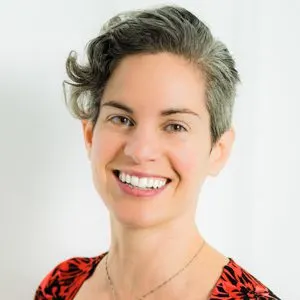
The author, Lillie Marshall, is a 6-foot-tall National Board Certified Teacher of English from Boston who has been a public school educator since 2003. She launched TeachingTraveling.com in 2010 to share expert global education resources, and over 1.6 million readers have visited over the past decade. Lillie also runs AroundTheWorld L.com Travel and Life Blog, and DrawingsOf.com for educational art. Do stay in touch via subscribing to her monthly newsletter, and following @WorldLillie on social media!
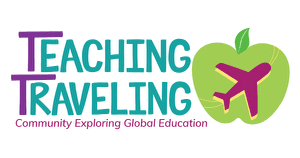
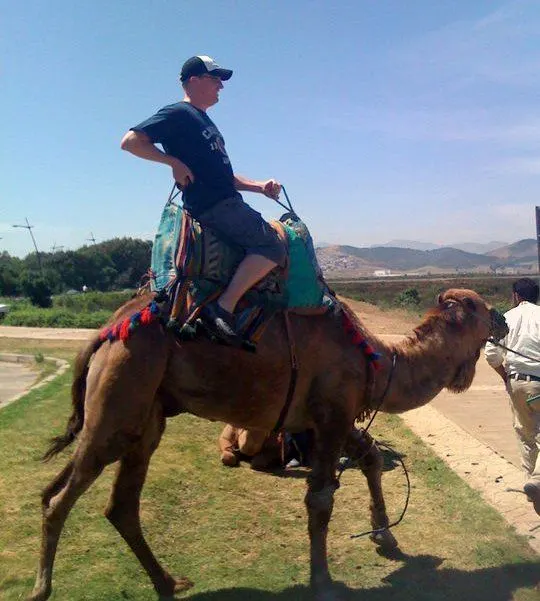

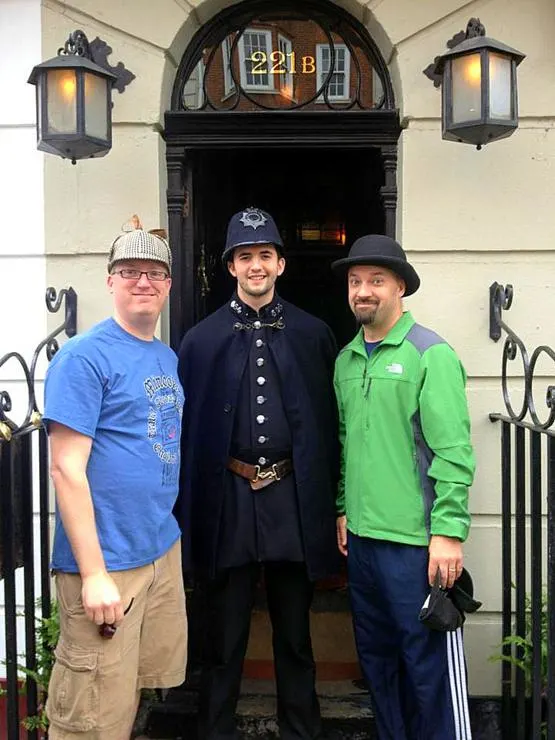
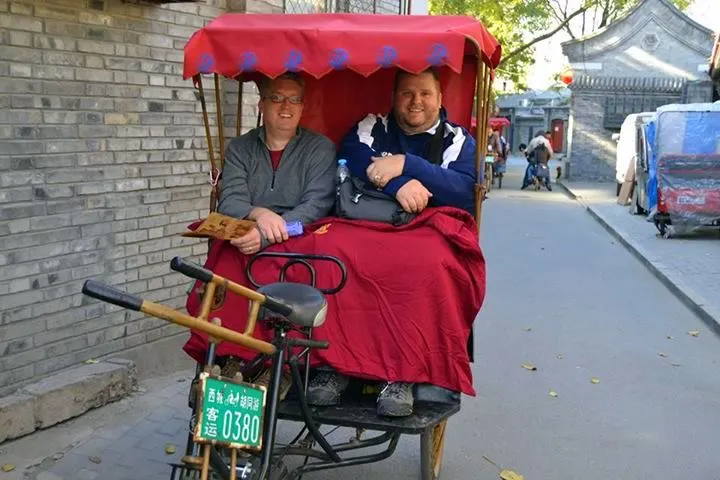

Kate Dana
Sunday 28th of September 2014
Another wonderful article from Teaching Traveling! Especially the part about the transformation from Mike to Michael. Great photo on the bridge in Ireland! Thanks Lillie for your fantastic website.
Lillie of TeachingTraveling.com
Sunday 28th of September 2014
:D :D :D
Drew
Monday 22nd of September 2014
I checked out your website. I't looks like you had lots of fun. Now I want to go there for one of my trips for those incredible views.
Denise Waters
Monday 15th of September 2014
I'm one of the teachers privileged enough to learn from Mike in Beijing. He's been incredibly helpful to me on several occasions. He knows his stuff and really will answer your questions. (Thanks again, Mike!) Educational travel is incredibly rewarding. I agree with him- find a way and just go!
Bill Parmenter
Sunday 14th of September 2014
Hats off and congratulations to Mike the teacher who had the patience and fortitude to travel with his students. Being a chaperone of students under any circumstances is demanding, but even much more so abroad. You didn't share any horror stories about student problems, but I can imagine you had some. Best wishes, Bill
Mike Curtis
Sunday 14th of September 2014
Also, if there are any teachers out there who'd like to start programs like this at their school or in their community, please feel free to contact me, and I would be more than happy to help them get started. The way see it, the more students we have out there seeing and experiencing the world, the better this world will be.
Lillie of TeachingTraveling.com
Sunday 14th of September 2014
Amen!